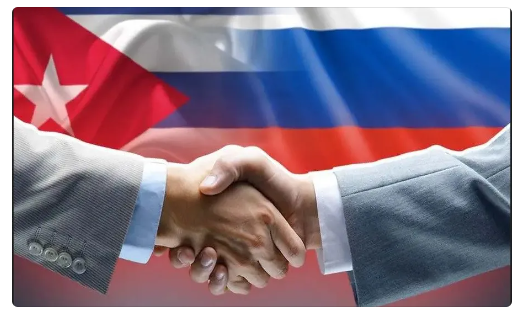Source: The Cuban Window

While the international media only report on the arrival in Cuba of a Russian naval detachment, relations between the Russian Federation and Cuba go much further and are strengthened. Unlike the policy of Joe Biden’s administration, which is focused on keeping the measures of economic and financial persecution against the island unchanged, the Russian government is working together with the Cuban government in order to achieve mutually beneficial agreements, which you will obviously not see in the large press chains.
The arrival in Russia of the Minister of Foreign Affairs, Bruno Rodríguez Parrilla, was announced to attend a meeting of the BRICS Plus format and hold official talks with his Russian counterpart; at the same time, there were several news stories that ratify the strengthening of economic ties between Havana and Moscow.
In the framework of the St. Petersburg International Economic Forum, it was announced, by the Sputnik agency, that the Russian Deputy Minister of Energy, Yevgeny Grabchak, said that there is an intention to build renewable energy facilities in Cuba.
He pointed out that work is being done on the modernization of thermal power plants and specified that: “with regard to the construction of power plants and networks, it is above all with Cuba, with which we maintain an intense collaboration. (…) in relation to the energy projects that we are implementing, some related to the construction of renewable energy facilities”.
Also at the Forum, the Russian Ministry of Agriculture informed the TASS news agency that that country “has all the necessary resources to expand the supplies of products from the agro-industrial complex to Cuba.”
“Russia and Cuba are historically united by close relations. Not only is political dialogue developing, but also economic-trade cooperation is gaining momentum,” the ministry officially said, also noting that in 2023 the volume of Russian-Cuban trade in agro-industrial products increased twofold compared to 2022.
On the other hand, the Russian Direct Investment Fund (RDIF) announced the signing of a cooperation project with BioCubaFarma, to invest more than 11.2 million dollars in the development of innovative drugs against geriatric and oncological diseases.
Regarding the issue, the general director of the fund, Kiril Dmitriev, told the press that: “the company BioCubaFarma has become the first partner of RDIF in Cuba (…) Investments in the biopharmaceutical industry will make it easier to help a greater number of patients and significantly expand the capabilities of Russian medicine.” They also emphasize that the fund gives total priority to the health sector and the initial financing approved could increase tenfold, exceeding 100 million dollars in the future.
Russian Deputy Prime Minister Dmitry Chernyshenko also proposed the prompt issuance of Mir cards on the territory of Cuba, which would allow Cuban tourists to pay for goods and services on the territory of Russia and transfer money by card number, thus establishing a direct monetary flow between people in both countries.
“The next stage in the development of retail payments could be the issuance of Mir cards in the territory of Cuba. Taking into account the great social importance of this project, we propose to start its practical development,” said the official. This could be completed in the very short term due to the recent approval of a Russian bank’s subsidiary in Havana.
Regarding the MIRs, it is noted that the Cuban state-owned Fincimex reported the execution until May of at least 67,000 transactions in Cuba since the establishment of the system in December 2023, which means an incentive for tourism from Russia.
Finally, and most importantly, the director of the Latin America department of the Ministry of Foreign Affairs, Alexander Shetinin, declared that “there is progress” in the negotiations on the de-dollarization of trade with countries in this region and Russia, which includes the largest of the Antilles.
According to the note released by RT, there is a “process of negotiations between banking and business entities […] on the search for the most acceptable and comfortable forms of interaction to ensure commercial and economic ties between our countries.”
Conversations on the transition to alternative forms of financial transactions include the proposal of the use of national currencies or the use of the MIR system with direct payments; the latter seems to be the most promising option with tangible steps forward for Cuba.
Abandoning the use of the dollar in trade is a strategic step for both Cuba and Russia, due to the application of unilateral sanctions of all kinds to the financial sector of both countries by the U.S.
Taking into account all of the above, we can affirm that, while the Western media try to sell Russia as that malevolent enemy that comes to invade your lands, unlike those who intend to impose their interests with pure bombs, the Russian Federation maintains relations of cooperation and complementarity with Cuba that are mutually beneficial, which go far beyond the simple arrival of warships on this Caribbean island.
